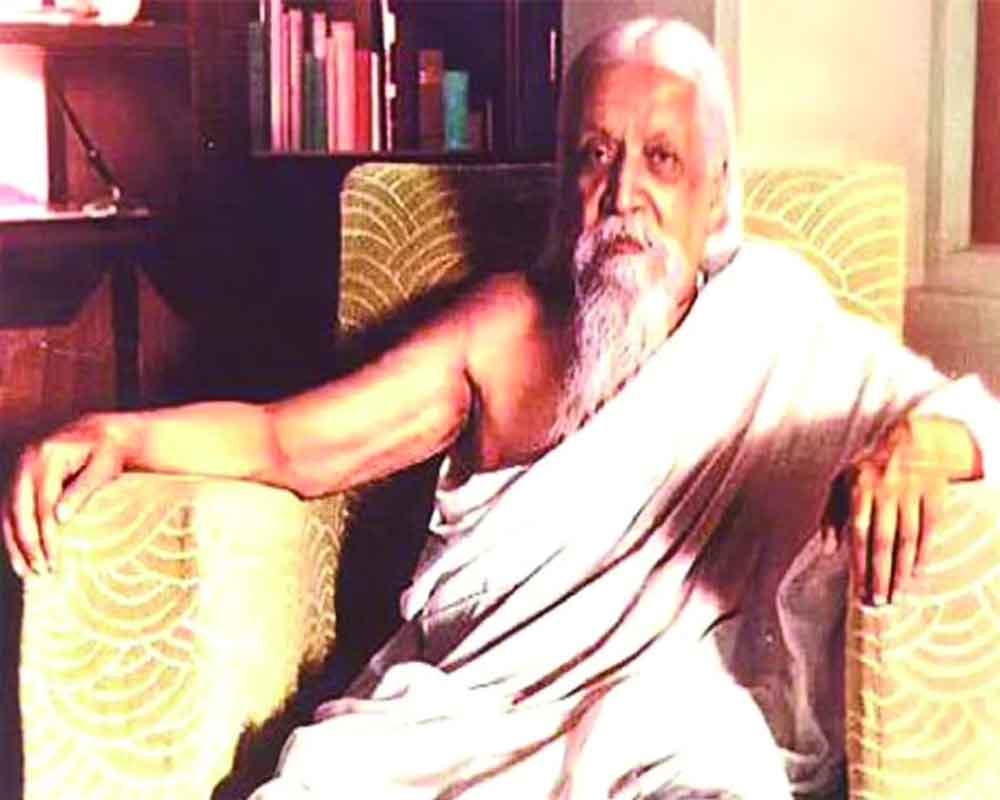Sri Aurobindo chose not to come up with another religion since he felt that religions had played their part in human evolution and it was time to move beyond its shell, writes Navin Upadhyay
In a country where people still take pride in quoting from the texts of Plato and Friedreich Nietzsche, author Pariksith Singh has done a wonderful job in highlighting the contribution made by “ our own” Maharshi Aurobindo in the sphere of an all-encompassing philosophical discourse in his well-researched book Sri Aurobindo and Philosophy.
The book delves deep into the works of Sri Aurobindo to present a compelling and fascinating collage of his multifaceted and multidimensional genius, who is not only one of the greatest political leaders of modern times but a supreme visionary, thinker par excellence, great scholar, and writer, spiritual guide and statesman, and a leader of all humanity.
The book has been launched to coincide with the 150th anniversary of the great sage of India who influenced every aspect of our thinking, starting from rediscovering the sacred messages of the Vedas to our deeper yearning for Independence from the British.
The author rightly calls Sri Aurobindo one of the greatest seers and thinkers of all time.” He is one of the tallest figures in a long line of illustrious metaphysicians and darshniks that humanity has produced. He ranks very high among the pre-Socratics, including Parmenides and Heraclitus, Plato, Kant, Hegel, and Heidegger, along with Wittgenstein and Derrida. And equally so among from the east such as the Vedic and Upanishadic rishis, Ved Vyasa, Sri Krishna, the Buddha, Adi Sankara, Ramanujacharya, down to the great Swami Vivekananda.”
The book primarily deals with two aspects: Sri Aurobindo and Indian philosophy; 2) Sri Aurobindo and Western Philosophy. The writer paints Sri Aurobindo as a bridge between Indian darshan and western philosophy. “He dramatically transformed Indian philosophies such as Vedanta and Advaita, Sankhya and Yoga, made them truly synthetic, practical and integral.”
The author has gone into detail talking about Sri Aurobindo’s seminal contribution to Indian philosophical thought and metaphysics. Singh points out that Sri Aurobindo brought Indian philosophy within the reach of the masses by simplifying it and turning it into pleasurable pursuit.
The author has pointed out that before Sri Aurobindo made his mark on the global philosophical arena, Indian darhshan wilted under the overpowering cultural and social influence of the Colonial masters, who looked down upon Indian culture, tradition, arts, and education system.
“Swami Vivekananda made a breakthrough for India on an international platform and presented India for the first time with this true swaroop to the west. Sri Aurobindo picked up from where Swamiji had left off with his tour de force and synergized Indian metaphysics with Western thought, including its ancient Greek cognitions and the more modern ones by Henri Bergson.”
At a time when India is seeing a bitter religious divide, the author has discussed Sri Aurobindo’s all-encompassing philosophy of religion that could serve as a unifying theme for our time.
The author says that Sri Aurbindo took the essence of all religions, not just intellectually but in practice and in his own person, Like Sri Ramakrishna Paramhansa before him, who showed in his life that there is inherent spirituality in each religion and denomination, such as Christianity, Islam, the worship of Rama or Shiva or Mahakali, Sri Aurobindo took the essence of each religion and looked to creating a life beyond religion as we know it.
The author has beautifully summed up Ari Aurobindo’s approach towards religion in the following paragraph: “He chose not to create another religion since he felt that religion had played its part in human evolution and it was time to move beyond its shell”.
The author presents perspectives on Sri Aurobindo’s vast oeuvre as a darshanik and shares his exalted dream and aspiration for India and humanity, his horizonless ranges that are their own skylines, his lights, and his snow-capped peaks.
It gives a glimpse into Sri Aurobindo’s pragmatic integral philosophy that is unique in being Vedantic in essence yet modern in expression and outlook.
Author Pariksith Singh is a poet, writer, entrepreneur, and healer. His life, work and literature are uniquely personalized expressions of his spiritual journey and unfolding realization. One can sense a constant striving towards deeper and wider truth in all that he is and does.
Pariksith’s creativity spans from literature, philosophy, and science to politics, business and entrepreneurship. He writes widely and deeply on all matters that he feels are relevant to contemporary human civilization. His concern, though all this, remains only one—the articulation of the deeper and the wider.
Pariksith first published The Shoreless River, followed by Riddles for Pesky Teenagers and his first Hindi poem, Chhuti Ke Din. Then came Kshitijon Ke Paar, and selections from Radha’s Geet, a series of mystical devotional poems in English, followed by There was a Girl I Loved Once, a collection of his English mystical-symbolica poetry, and Swayam Ka Ghuspaithiya, a collection of his symbolical Hindi poetry, in 2018. The companion volume to this book, Sri Aurobindo and the Literary Renaissance of India, was published in 2021. Pariksith lives in Florida with his wife and four children and practices medicine.

